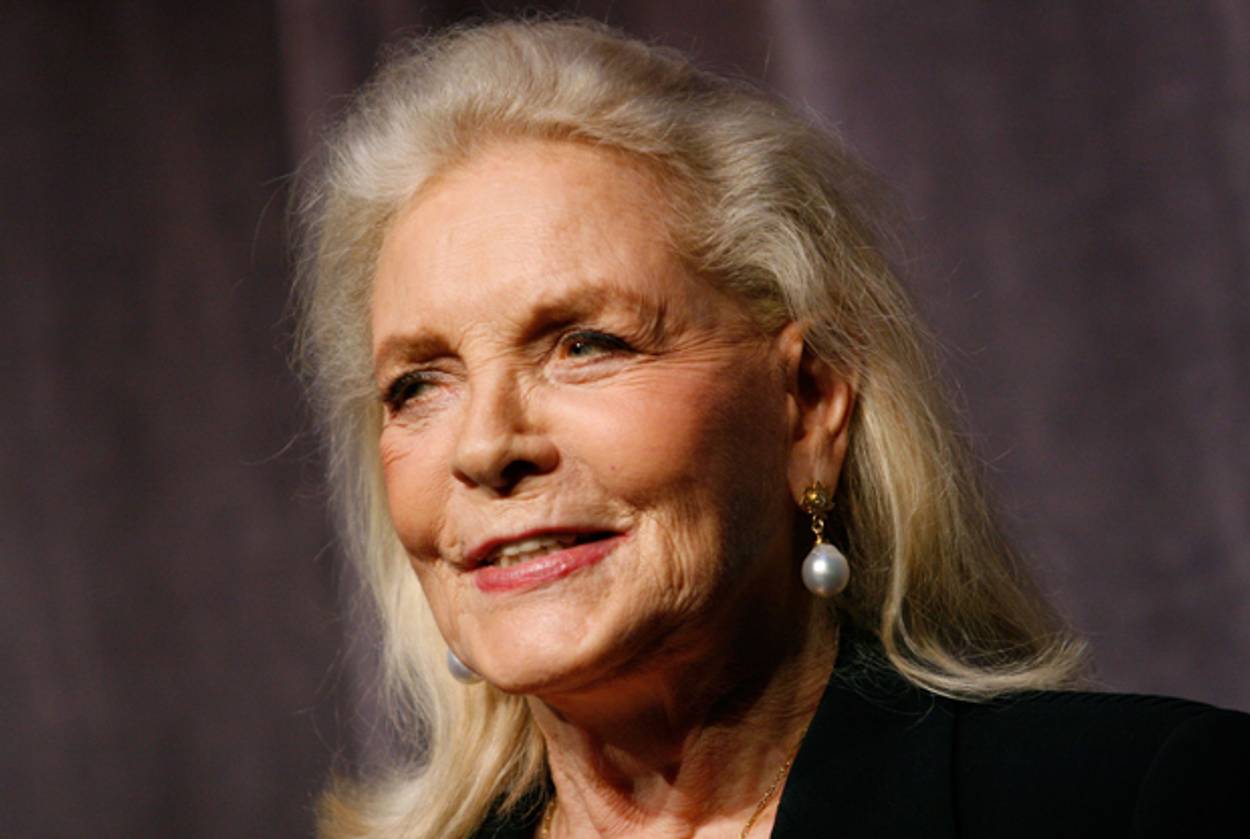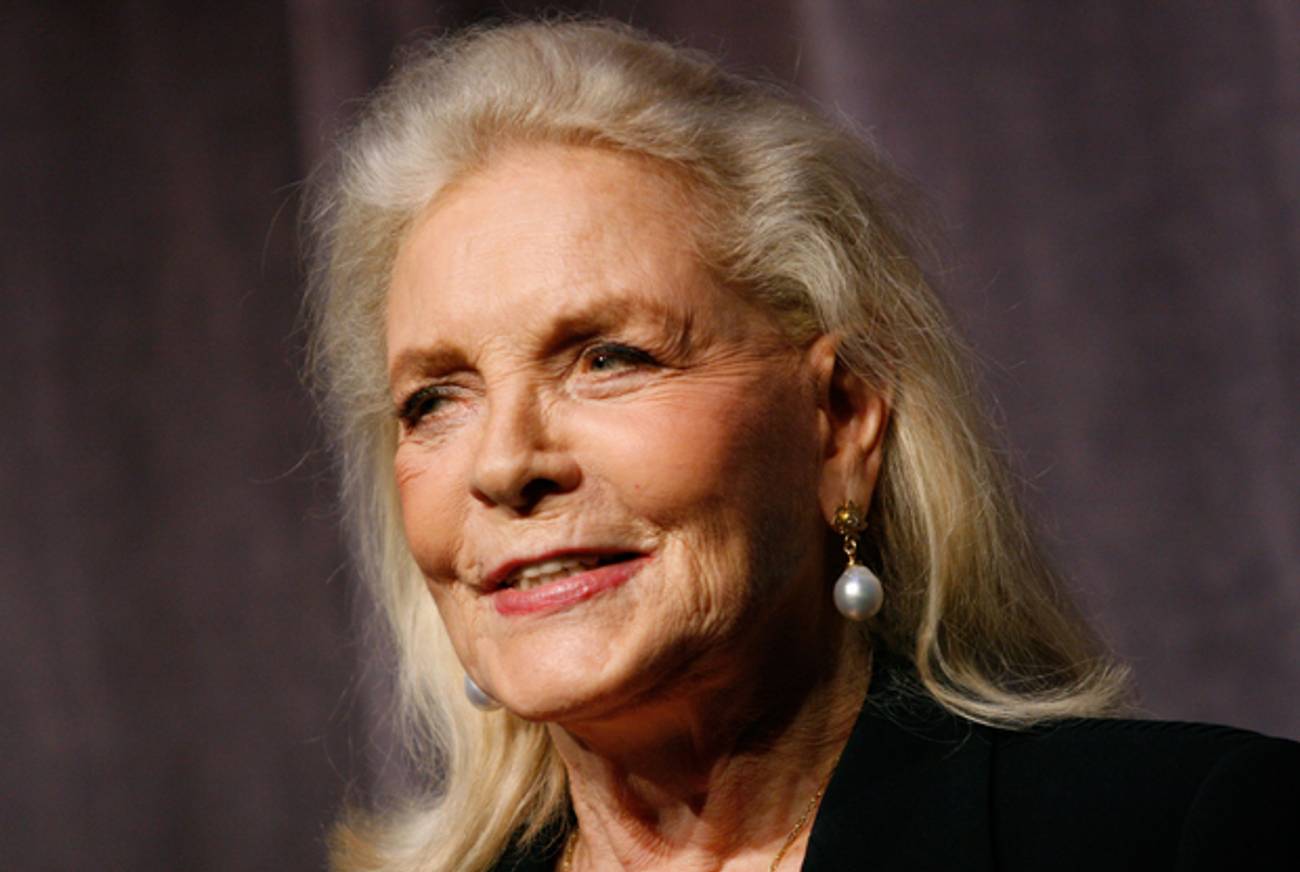Lauren Bacall, I Love You
And after years not caring about such things, I loved learning you were Jewish




When I was growing up in the 1950s, I knew all the movie stars who were Jewish but just somehow weren’t showing it in their names. Maybe that was because my family lived in L.A., home of the movies and a Jewish community absolutely catapulting itself into stellar new realms of achievement.
But it wasn’t the Jewish scientists or violinists or businessmen I was most aware of. It was the movie stars, and those who had changed their names, who most fascinated my mother, Pearl.
I don’t mean Eddie Cantor and Jack Benny and folks like that where it’s obvious. I’m talking about Tony Curtis (Bernie Schwartz) and Kirk Douglas—get ready for this one: Kirk Douglas was born Issur Danielovitch—and so forth.
This crucial cultural knowledge was imparted to me by my mom. We would look at the movie ads together, and if Kirk Douglas was starring in, say, The Indian Fighter, a film I craved to see, she would somehow find an opening to let me know Kirk or the other Jewish stars’ long Yiddish or Polish or decidedly foreign-sounding birth names.
I’m not sure why.
Even at this far remove I can’t be sure if it was to send me some kind of message of Jewish pride. Or of how great America and L.A. were–mom was an undocumented immigrant from Canada in the 1920s, having been brought over to Toronto as a baby from near Kiev. I suppose that would make her, in our new lingo, a kind of Yiddish-speaking Dreamer.
But she wasn’t, I don’t think, giving me a message about pursuing the American dream, nor, the obverse: She wasn’t saying to me, a little 12-year-old, wherever you go in life, please don’t change your name like these guys did.
Now I’m wondering if there was another possibility: that she thought I was cute enough as a 12-year-old to try to be a movie star on my own. In that case, it’s understandable: during the post-Holocaust 1950s you had to appeal to a mass audience, since the culture was still not all that high on the Jews. If I had to change my name from Appel to, well, whatever, that would be okay with her.
No, I don’t think that was the case at all.
My mother’s own immigrant name, Dzortkoff, had been rendered either by her dad’s choice or the whimsy of a Canadian customs official, to Dawson. Pearl Dawson, it was. And I think she went by the name, as a kid, of Paulene Dawson.
In retrospect that almost sounds like a movie star’s name. Paulette Goddard, maybe.
Over the years my mother’s preoccupation led me to another cultural tidbit: Many movie stars, Jewish and non-Jewish (I never learned the latters’ born names) take as their stage names two first names: like Tony or Kirk or John Wayne.
Why? With two first names, you can never tell who’s Jewish or Irish or whatever. You appeal to the mass audience that movies seek to attract.
I don’t think Pearl ever let on that she thought there was anything at all wrong with a Jewish-born movie star changing his name, or letting the agent or the studio head do it. At no point did she seem to suggest that you compromise your Jewish identity when you accept such a trade-off.
We never discussed the issue—who discussed anything but what was for lunch and school stuff, of course?—but I came away from my mother’s fascination with Jewish celebrity monikers with a kind of style of thinking that I don’t believe she would have approved of.
Namely, ever since those lessons I have gone out of my way not to want to know who’s Jewish in the movies or in science or in any field of human endeavor. And as to related Big Important Cultural Questions like what is a Jewish novel, pardon me, I’ll watch the Yankees (and not even give a thought, by the way, that Ron Blomberg is the first …)
That is, I have studiously resisted the urge to ask the “Is he (or she) Jewish?” question in encounters both in person and on the page.
So it’s come to me as a tremendous surprise to learn Laruen Bacall, late of blessed memory, was among The Chosen.
Thanks to Mother Appel I hadn’t a clue–that Bacall was nee’ Betty Joe Perske, daughter of Natalie Weinstein, and most definitely a child of the great Jewish Bronx.
Well, I must say that all the ‘is he or isn’t he’ I had been repressing for decades has come rushing back with a torrent of tribal pride that is as pleasant as it is surprising.
I’m a member of the legions of fans who love film noir, and among whose favorites are of course The Big Sleep and To Have and To Have Not, in which Bacall emerged and was launched as a star.
I love the look and the realness of her and the whole nine yards of her talent, and, frankly, the way she has lived her life, as I glean it, from the stellar obits and the reruns of the days since she passed away.
I read them all, voraciously looking for where she may have gone to Hebrew school. I’m not even bothered or interested in the how and why she decided to let Bogart raise their kids as little Episcopalians.
No bar mitzvahs for the Bacalls? Big deal.
That only increases my pride that the Jews and the Bronx turned out such a gorgeous, stand-up, wonderfully talented, funny, and wise woman.
Call it a pent-up tribal pride that my 1960s-era identity-politics-hating sensibilities have not permitted to ooze out, but there you have it.
Allan Appel is a novelist, poet, and playwright whose books include Club Revelation, High Holiday Sutra, and The Rabbi of Casino Boulevard.
Allan Appel is a novelist, poet, and playwright whose books include Club Revelation, High Holiday Sutra, and The Rabbi of Casino Boulevard.